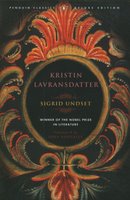
It's only October 2006, but I'm already planning my 100 Books To Read 2007. It's a bit of a headache, as I'm not even halfway done with the 2006 reading list. I'll probably carry some titles over for 2007.
I'm still shortlisting (and abandoning) titles. But some titles have been Set In Stone as Must Reads. So, here I present:
100 Books To Read 2007
Selection #1: Kristin Lavransdattar by Sigrid Undset
For those who have never heard of Sigrid Undset, you're in good company. I'm ignorant of Norwegian literature. Part of the purpose of my 100 Books To Read list is to set a schedule for myself to read more widely. Thankfully, William T. Vollmann did a recent round-up of Norwegian books to check out for Salon.com. Here is what he wrote about Kristin Lavransdattar and her other masterpiece, The Master of Hestviken:
Kristin Lavransdattar's three novels (1920-1922) follow their eponymous heroine from her early childhood to her death from the Black Plague. It is one of the greatest love stories ever written, because it is one of the truest. For the sake of a man, Kristin sacrifices a great deal that she values, including her purity, her honesty and her obedience to her father, who is one of the most lovingly delineated characters in literature. She finally marries her sweetheart, only to learn that he and she cannot make each other happy. But Undset manages to convince us that if happiness will not be hers, perhaps she has won something similar to the treasure of an Eddic heroine: a destiny, a doom, that simultaneously fulfills and befits her. At the end, one feels that she could not have lived her life in any other way, with any other man."The Master of Hestviken" (1925-1927) is also a love story of sorts. The hero of this tetralogy is a friendless orphan named Ølav who cleaves only to his foster sister, Ingunn, a weak-willed, sickly girl to whom he was betrothed by his dying father. When the young couple are parted by violent legal difficulties, Ingunn has a fling with an Icelander and gets pregnant. To save her honor, Ølav kills the seducer, marries Ingunn and gives out that the child is his. All his life he longs to confess the manslaughter and do penance for it, but first Ingunn pleads with him not to, and then later, after she has suffered a long and ghastly death, he feels a mixture of duty to Ingunn's memory and revolted pity for the bastard, who adores him; and so the years go by, until this faithful, loving, bravely steadfast man has been utterly eaten up by his unshrived sin. Every time I reread this book I try to find the place where Olav "went wrong," and I cannot. This work reminds me of Sophocles -- or, better yet, of the old Norse sagas, whose heroes are simply "fated" to do what they do. Indeed, Undset's Norway retains its Eddic dwarfs, elf temptresses and mountain dwellers. Even Odin and the death goddess Hel get mentioned. And both Kristin and Olav are Eddic in their uncomplaining bearing of destiny's burden.
~ From Salon's Literary Guide to Norway
No comments:
Post a Comment